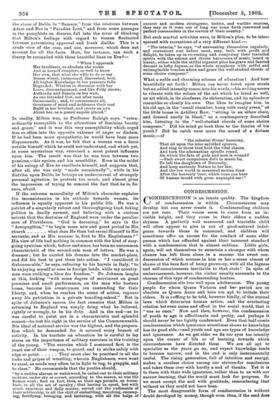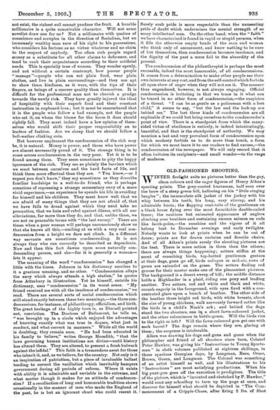CONDESCENSION.
CONDESCENSION is an innate quality. The kingdom of condescension is within. Circumstances may develop but can never create it Condescending children are not rare. Their voices seem to come from an in- visible height, and they rouse in their elders a sudden shyness. A perfectly well mannered and tractable child will often appear to give in out of good-natured indul- gence towards those in command, and children will sometimes offer an excuse for the conduct of some elder person which has offended against their innocent standard with a condescension that is almost sublime. Little girls, again, will Bet themselves to entertain a stranger with whom chance has left them alone in a manner the sweet con- descension of which arouses in him or her a sense almost of shame at the bare fact of being grown-up, with all the bigness and self-consciousness inevitable to that state ! In spite of embarrassment, however, the visitor usually succumbs to the charms of thia type of condescending hostess.
Condescension sits less well upon adolescence. The young people for whom Queen Victoria and her period are as obsolete as Queen Anne and hers are apt to irritate their elders. It is ruffling to be told, however kindly, of the eternal laws which determine human action, and the everlasting relation between cause and effect in the social world, that it "was so once." Now and then, however, the condescension of youth to age is affectionate and pretty, and perhaps it should never be too lightly condemned. Even that half-comic condescension which ignorance sometimes shows to knowledge has its good side,—and youth and age are types of knowledge and ignorance. As we get older we fix our eyes too intently upon the corner of life or of learning towards which circumstances have directed them We are all apt to specialise as the years go on, and expert knowledge tends to become naiTow, and in the end is only instrumentally useful. The rising generation, full of intuition and energy, makes a careless choice among our striven-for conclusions and takes them over with hardly a nod of thanks. Yet it is to them with their wide ignorance, rather than to us with our narrow learning, that the world must look for progress. So we must accept the nod with gratitude, remembering that without us they could not have been.
The most disagreeable form of condescension is without doubt developed by money, though even then, if the seed does not exist, the richest soil cannot produce the fruit. A humble millionaire is a quite conceivable character. Will not some novelist draw one for us ? Not a millionaire with qualms of conscience and scruples in the direction of Socialism, but an immensely wealthy man sure of his right to his possessions, who considers his fortune as no virtue whatever and no claim to the respect of anybody. Too often rich people regard money as a substitute for all other claims to deference, and tend to rank their acquaintance according to their artificial needs. This is specially true of women. They wonder openly, and not without a certain contempt, how poorer people "manage "—people who can eat plain food, wear plain Clothes, and live in plain surroundings—and they are apt to show them kindness, as it were, with the tips of their fingers, as beings of a coarser quality than themselves. It is difficult for the professional man not to cherish a grudge towards the newly rick. They have greatly injured the ideal of hospitality with their superb food and their constant instruction in cupboard-love ; but it must be remembered that it is the people who follow a bad example, not the people who set it, on whom the blame for the harm it does should rightly ftdl. They must indeed have a low opinion of them- selves who would shift their proper responsibility on to leaders of fashion. Are we sheep that we should follow a bell-wether clinking coin.
But however unpleasant the condescension of the rich may be, it is natural. Money is power, and those who have power are almost necessarily proud of it. The strange thing is to come across condescension in the very poor. Yet it is to be found among them. They seem sometimes to pity the happy ignorance of the rich. They see so plainly the barriers which we erect between ourselves and the hard facts of life, and think them more effectual than they are. "You know,—or I expect you don't know," they say sometimes as they describe familiar hardships to a well-to-do friend, who is perhaps conscious of repressing a strange momentary envy of a more vivid experience,—an experience he spends his life in avoiding for himself and his children. They must know well that we are afraid of many things that they are not afraid of, that we have falls to dread against which they need take no precaution, that we hate and rebel against illness, with all our alleviations, far more than they do, and that, unlike them, we are not on peaceable terms with "the last enemy." There are times when a poor woman will perhaps unconsciously show us that she knows all this,—smiling at us with a very real con- descension from a height we dare not climb. In a different way servants are sometimes condescending. It is not always they who can correctly be described as dependents. Now and then this fact dawns upon some naturally con- descending person, and she—for it is generally a woman— lets it appear.
The meaning of the word "condescension" has changed a little with the times. Johnson in his dictionary ascribes to it a gracious meaning, and no other. "Condescension allays the envy which always attends a high station," he quotes from Atterbury in illustration. Yet he himself, outside his dictionary, uses "condescension" in its worst sense. "My friend received me with all the insolence of condescension," we read. There are several sorts of social condescension which still stand exactly between these two meanings,—the three con- descensions, for instance, of philanthropy, officialism, and birth. The great heritage of the highly born is, as Disraeli pointed out, conviction. The Duchess of Bellamont, he tells us, "was brought up in a circle which enjoyed the advantages of knowing exactly what was true in dogma, what just in conduct, and what correct in manners." While all the world is doubting, they remain sure. "He had been educated in his family to believe," writes George Meredith, "that the laws governing human institutions are divine—until history has altered them. They are altered, to present a fresh bulwark against the infidel." This faith is a tremendous asset for those who inherit it, and, as we believe, for the country. Not only is it an inspiration of patriotism, but a piece of invaluable ballast tending to correct the vacillation which inevitably hampers government during all periods of reform. Where it exists with ability it is admirable and enviable in the extreme, and what matter though it makes for an attitude of condescen- sion? If a recollection of long and honourable tradition shows occasionally in the manner of men who made the England of the past, he is but an ignorant churl who could resent it.
Surely such pride is more respectable than the nauseating pride of doubt which undermines the mental strength of so many intellectual men. On the other hand, when the "faith" we have characterised is found in vapid or stupid persons, when it fills the otherwiee empty heads of the man and woman who think only of amusement, and know nothing to be sure of but themselves, then condescension becomes insolence, and the dignity of the past a mere foil to the absurdity of the present.
The condescension of the philanthropist is perhaps the most excusable, indeed the most honourable, of all condescensions. It comes from a determination to make other people see their own interests at any cost, and from the self-control which forbids all open show of anger when they will not see it. The manner thus engendered, however, is not always engaging. Official condescension is irritating in that we trace in it what can be traced in no other form of condescension,—the suspicion of a threat. "I can be as gentle as a policeman with a lost child," it seems to say, "but the law and the look-up are behind me." The last three kinds of condescension are all explicable if we could but bring ourselves to the condescender's point of view. There is a standpoint from which the many- sided virtue of obedience is entirely, is indeed intoxicatingly, beautiful, and that is the standpoint of authority. We may mention a last and very prevalent form of condescension upon which modesty forbids us to do more than touch, a form for which we must leave it to our readers to find excuse,—the condescension of the newspaper. We will only record that it often irritates its recipients—and small wonder—to the verge of madness.







































































 Previous page
Previous page